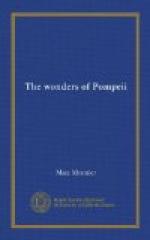On the instant, the Pompeians, terrified, bewildered, rush from the amphitheatre, happy in finding so many places of exit through which they can pour forth without crushing each other, and the open gates of the city only a short distance beyond. However, after the first explosion, after the deluge of ashes, comes the deluge of fire, or light stones, all ablaze, driven by the wind—one might call it a burning snow—descending slowly, inexorably, fatally, without cessation or intermission, with pitiless persistence. This solid flame blocks up the streets, piles itself in heaps on the roofs and breaks through into the houses with the crashing tiles and the blazing rafters. The fire thus tumbles in from story to story, upon the pavement of the courts, where, accumulating like earth thrown in to fill a trench, it receives fresh fuel from the red and fiery flakes that slowly, fatally, keep showering down, falling, falling, without respite.
The inhabitants flee in every direction; the strong, the youthful, those who care only for their lives, escape. The amphitheatre is emptied in the twinkling of an eye and none remain in it but the dead gladiators. But woe to those who have sought shelter in the shops, under the arcades of the theatre, or in underground retreats. The ashes surround and stifle them! Woe, above all, to those whom avarice or cupidity hold back; to the wife of Proculus, to the favorite of Sallust, to the daughters of the house of the Poet who have tarried to gather up their jewels! They will fall suffocated among these trinkets, which, scattered around them, will reveal their vanity and the last trivial cares that then beset them, to after ages. A woman in the atrium attached to the house of the Faun ran wildly as chance directed, laden with jewelry; unable any longer to get breath, she had sought refuge in the tablinum, and there strove in vain to hold up, with her outstretched arms, the ceiling crumbling in upon her. She was crushed to death, and her head was missing when they found her.
In the Street of the Tombs, a dense crowd must have jostled each other, some rushing in from, the country to seek safety in the city, and others flying from the burning houses in quest of deliverance under the open sky. One of them fell forward with his feet turned toward the Herculaneum gate; another on his back, with his arms uplifted. He bore in his hands one hundred and twenty-seven silver coins and sixty-nine pieces of gold. A third victim was also on his back; and, singular fact, they all died looking toward Vesuvius!
A female holding a child in her arms had taken shelter in a tomb which the volcano shut tight upon her; a soldier, faithful to duty, had remained erect at his post before the Herculaneum gate, one hand upon his mouth and the other on his spear. In this brave attitude he perished. The family of Diomed had assembled in his cellar, where seventeen victims, women, children, and the young girl whose throat was




